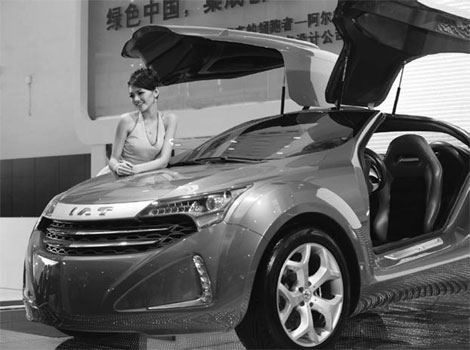Cover Story
Electric car sector calls for support
By Wang Chao (China Daily)
Updated: 2010-10-08 10:55
 |
Large Medium Small |
|
An IAT (China) Automobile Technology Co Ltd electric car is displayed at a Beijing exhibition. Da Wei / For China Daily |
BEIJING - China needs to build more recharging stations and improve battery production to promote the use of electric cars, automakers said.
So far, more than 40 Chinese car manufacturers claimed they are producing electric cars, and more than 1,000 factories are producing electric car batteries.
However, very few private electric cars have been sold, automakers said. At present, most of the 10,000 electric vehicles running in China are buses and sanitation vehicles in big cities subsidized by local governments.
High prices and a shortage of recharging stations make people reluctant to buy electric cars, said Xie Zicong, assistant general manager of Beijing-based China New Energy Dynamic Co.
The price of an electric car can be 100 to 200 percent more than a traditional car.
Technically, a set of batteries on an electric car needs six hours to be fully recharged and can power the car for 100 km.
However, China only has 98 recharging stations and thousands of recharging poles.
By the end of this year, the State Grid Corp of China will build 75 recharging stations across China, Li Lili, an engineer from the State Grid Energy Research Institute, told China Daily.
The company has opened China's largest recharging station in June in Linyi in East China's Shandong province.
The 23 million yuan ($3.3 million) station can recharge 15 electric cars and 30 electric buses at the same time.
"We need a lot more of such stations so people will find it convenient to use electric cars," Xie said.
Chinese carmakers have geared up to develop electric vehicles in a bid to gain a head start in the fledgling but potentially profitable market.
Some automakers are trying their luck in the leasing market, but Hangzhou-based Zotye Auto, which recently put 50 electric cars up for rent, said it is not very optimistic about the market.
Because of the tepid response, most manufacturers are making electric cars on a small scale and none have built a production line for mass production, Xie said.
The quality of the battery is another hurdle hampering the development of Chinese electric cars.
Batteries made in Japan can be recharged more than 3,000 times but most batteries made in China can be recharged less than 1,000 times, Xie said.
Wang Zidong, director of the battery testing center of China North Vehicle Research Institute, admitted that Chinese batteries have a long way to go.
Among the 1,000 electric car battery manufacturers in China, at least five types of batteries are being produced, with different materials including lithium manganese and lithium titanate.
Hans-Georg Frischkorn, managing director of the German Association of the Automotive Industry, expressed his concern over this situation. "Lack of a universal standard on batteries and recharging stations will harm future cooperation, especially when we need to import spare parts from other countries," he said.
Wang agreed with Frischkorn but said China may need time to solve all the problems.
"China is a latecomer in the new-energy car industry. Toyota began to do research on new energy cars in 1965 but it hasn't made a profit. For China, a country that came into the industry just a decade ago, we need to be patient," he said.
China Daily





